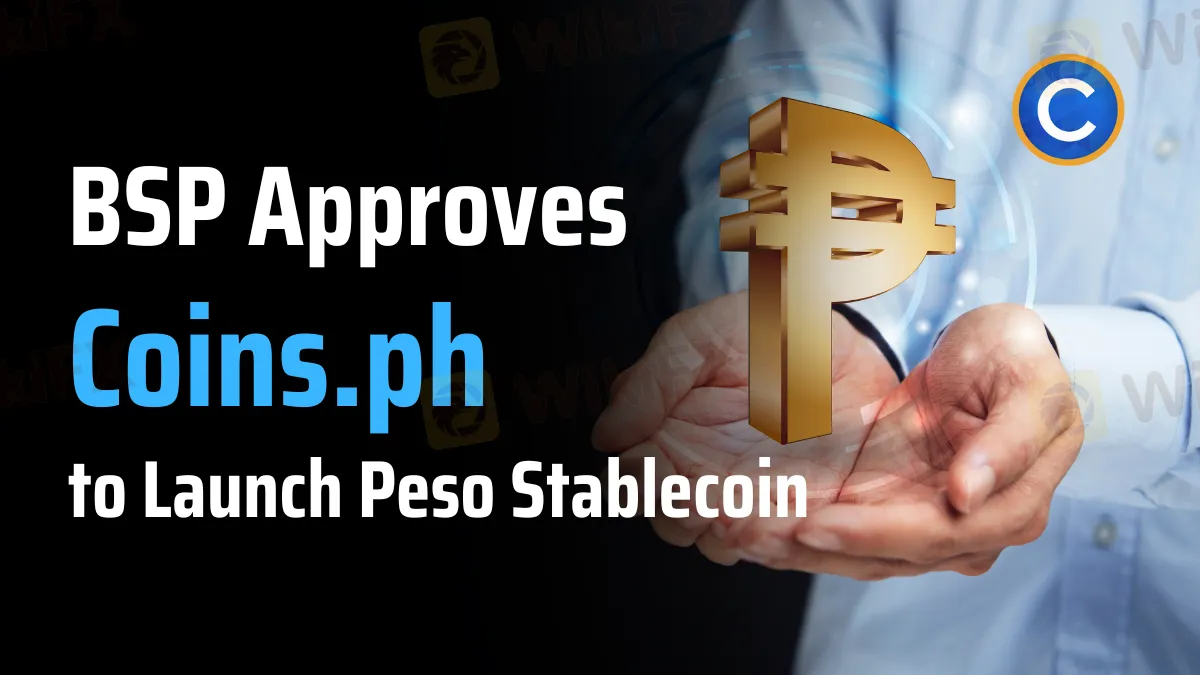简体中文
繁體中文
English
Pусский
日本語
ภาษาไทย
Tiếng Việt
Bahasa Indonesia
Español
हिन्दी
Filippiiniläinen
Français
Deutsch
Português
Türkçe
한국어
العربية
BSP Approves Coins.ph to Launch Peso Stablecoin
Abstract:In the Philippines, Coins.ph receives BSP approval for PHPC, a peso-backed stablecoin, launching in June for peer-to-peer transactions.

Coins.ph has received approval from the Bangko Sentral ng Pilipinas (BSP) to launch PHPC, a stablecoin backed by the Philippine peso, marking a key milestone for the country's financial technology industry. The launch of this cutting-edge digital currency on the Coins.ph platform in early June will be a watershed moment in the country's digital transformation of financial transactions.
Wei Zhou, the CEO of Coins.ph, made the news during a Taguig City press conference. Zhou emphasized that after starting the procedure in the first quarter of the year, the business got BSP clearance for a sandbox in April. It will take two to three months to complete the sandbox, a regulatory framework for evaluating innovative financial innovations. Coins.ph wants to achieve certain KPIs and incorporate 20,000–30,000 users into the system in this time frame.

PHPC can change the Philippines' financial sector. It is 1:1 pegged to the Philippine peso and backed by cash and currency equivalents kept in local bank accounts, ensuring stability. This agreement will provide users with access to a stable and trustworthy digital currency, ensuring that each PHPC is equivalent to one real peso.
Its launch is significant because PHPC is the first peso-backed stablecoin that is usable for retail purposes. It supports both peer-to-peer transactions and business-to-business contacts. This broad variety of possible applications indicates a substantial shift in the way digital transactions are conducted, from traditional banking hours to a more dynamic, round-the-clock financial interaction paradigm.
Remittances are an important source of income for many Filipinos, thus, Zhou predicts that this will be one of PHPC's main uses. “PHPC is expected to lower the costs and barriers for sending money back home,” Zhou said. “Moreover, it enables real-time transactions at any time of the day, significantly enhancing the efficiency of financial transfers.”
The BSP-supervised launch of PHPC by Coins.ph is a significant development as the Philippines' financial industry embraces digital innovation. It is compatible with the global trend toward more linked and real-time financial systems, as well as the growing trend toward digitalization. PHPC is expected to play a significant role in the Philippines' digital financial environment because of its capacity to revolutionize a variety of financial operations, including trading, payments, and remittances.

Disclaimer:
The views in this article only represent the author's personal views, and do not constitute investment advice on this platform. This platform does not guarantee the accuracy, completeness and timeliness of the information in the article, and will not be liable for any loss caused by the use of or reliance on the information in the article.
Read more

Colorado Duo Accused of $8M Investment Fraud Scheme
ROI Cash Flow Fund duped investors of $8M in a fraudulent forex trading scheme. McPhee and Posey now face wire fraud and money laundering charges.

21 Arrested in Telangana Cryptocurrency Scam
Telangana Police arrests 21 in a cryptocurrency scam. Cybercriminals extorted money, laundered ₹8.2 crore, and transferred it via wallets linked to Dubai.

Two Californians Indicted for $22 Million Crypto and NFT Fraud
Gabriel Hay & Gavin Mayo indicted for $22M crypto fraud. Learn about the Vault of Gems scam and how to avoid NFT rug pull schemes.

SEC Approves Hashdex and Franklin Crypto ETFs on Nasdaq
The SEC has approved crypto index ETFs by Hashdex and Franklin Templeton, including Bitcoin and Ethereum, marking a milestone in crypto asset investment.
WikiFX Broker
Latest News
AIMS Broker Review
The Hidden Checklist: Five Unconventional Steps to Vet Your Broker
Russia to Fully Ban Crypto Mining in 10 Regions Starting January 1, 2025
YAMARKETS' Jingle Bells Christmas Offer!
Why is there so much exposure against PrimeX Capital?
Two Californians Indicted for $22 Million Crypto and NFT Fraud
WikiFX Review: Is Ultima Markets Legit?
Colorado Duo Accused of $8M Investment Fraud Scheme
MTrading’s 2025 "Welcome Bonus" is Here
Malaysia Pioneers Zakat Payments with Cryptocurrencies
Currency Calculator


